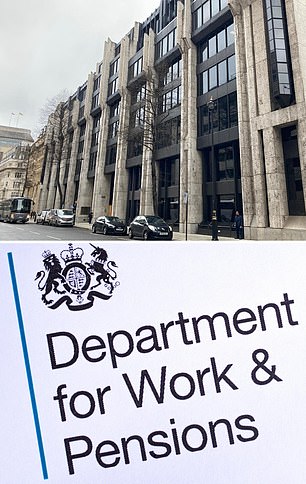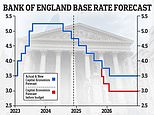DWP says my late mother was underpaid state pension, so who inherits this money? STEVE WEBB replies
- Has your pension question been answered? Read Steve Webb's replies
- Most popular Steve Webb columns on the state pension: The 14 hot topics

State pension: Last year, the DWP admitted that there could be nearly 200,000 people who claimed child benefit and have missed out
Steve Webb answers his 400th question from a This is Money reader today - watch out for a series of articles and events to celebrate this landmark all this week.
I've been told by the DWP that my late mother is owed five years' worth of pension credits.
Would this form part of my mother's estate or are the payments made direct to the next of kin?
SCROLL DOWN TO FIND OUT HOW TO ASK STEVE YOUR PENSION QUESTION
Steve Webb replies: I'm assuming you are referring here to missing National Insurance credits to help with your late mother's state pension.
When I first started challenging the Government about gaps in the National Insurance records of thousands of mothers back in the late 2000s, I didn't expect that 15 years later they would still be trying to sort out the problem.
The letter you have received is part of a massive exercise being undertaken by the Government to identify people – mostly mothers – who may have missed out on protection for their state pension record for time at home with children.
When it was initially introduced in 1978, the system was known as Home Responsibilities Protection (HRP) and from 2010 this protection come through a system of National Insurance credits.
The issue has arisen because it was possible to claim child benefit prior to 2000 without including a National Insurance number.

Got a question for Steve Webb? Scroll down to find out how to contact him
The problem with this is that this information is used to put HRP or NI credits onto a separate computer system. If the NI number is missing from the child benefit computer then the match may never be made.
Last year, the DWP admitted that there could be nearly 200,000 people who have missed out, and set aside over £1billion for potential payments of state pension arrears.
But by the end of March 2024 it had reviewed just 419 cases, which suggests we are at the start of a very long journey.
Last week, HMRC said it has now written to over 250,000 people over pension age who are potentially eligible and is starting to write to those under pension age.
Anyone who has received such a letter should make sure that they respond so that their position can be checked.
What about people affected who have already died?
The DWP admits that out of those 200,000 people who they think may eventually prove to be eligible, around 43,000 have sadly died without ever receiving their correct pension.
Now that you have been told that your late mother had missing years of NI credits, the DWP should reassess her state pension and work out if any arrears are due.
It is worth mentioning that adding HRP does not always lead to a boost in state pension entitlement and therefore does not always lead to an arrears payment.
In some cases, the woman concerned had so few years of actual paid NI that, even with the addition of HRP, she still does not have enough to qualify for a pension in her own right.
And some women reached pension age after their husband had retired and went straight on to a pension based on his record, so small changes to their own record may again make no difference to their entitlement.
However, if we assume that some arrears are due, the DWP then has to find someone to pay it to.
In general, if the DWP has details of a surviving spouse it would pay any lump sum arrears to that person.
If not, it would then need to track down other 'next of kin' such as a surviving son or daughter.
In some cases, the person who died may have indicated in their will that their 'wordly goods' should go to someone else, but the DWP does not have access to people's wills and I'm sure does not want to go near potential disputes around who should benefit.
For that reason it will simply pay to 'next of kin' regardless of what a will may say.
If there are multiple claims, the payment can be split, and each party who wishes to claim such arrears has to complete a BR330 or SPL25D form.
One of these would normally be sent out alongside the letter notifying the family of potential arrears.
One final point which may be relevant to other readers is that if you receive a letter in respect of a loved one who is no longer with us, you can still fill in the HRP application form posthumously.
The way this works is that you fill in the form in the name of the person who had died, but then sign it yourself and explain why you are doing so.
You should then be able to apply for any HRP that was due and in due course receive any arrears.
SAVE MONEY, MAKE MONEY
Affiliate links: If you take out a product This is Money may earn a commission. These deals are chosen by our editorial team, as we think they are worth highlighting. This does not affect our editorial independence. *Chase: Cashback available for first year. Exceptions apply. 18+, UK residents.
















































































